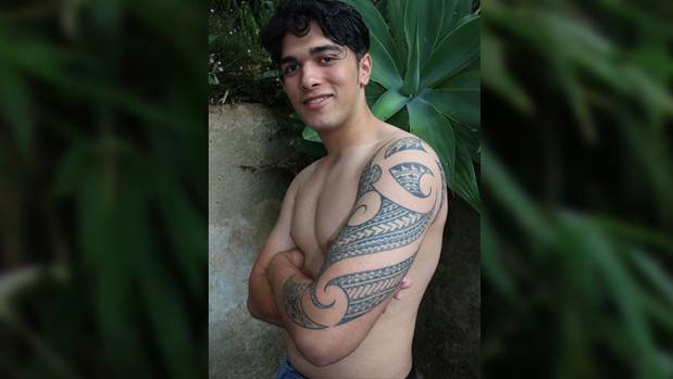
A teenage boy plans to lay a complaint with Human Rights Commission after his high school forced him to cover up his traditional Pasifika tattoos.
Marli Atu received the tatau - the pattern telling the story of his blended Fijian and Samoan heritage, as well as his close connection to Maori culture- last November as a gift for his 16th birthday.
Students are banned from having visible tattoos at Glenfield College, a decile 6 school on Auckland's North Shore.
But the Year 12 student said he felt "shameful" when teaching staff at the school told him to wrap his tatau with a bandage.
"This is more than a tattoo. My tatau is my culture, my ancestors, my heritage, my whakapapa. And I felt shameful I needed to hide my culture with a bandage, like it was a disease," Marli said.
"I know the school didn't mean it that way but the tattoo rule is inadvertently offensive to minorities like Pasifika peoples."
He refused to put a bandage on and instead wears a winter jacket to cover the tatau - designed by ta moko artist Inia Taylor - in the summer heat.
When told to cover up, Marli says he tried to challenge the school rules by raising the cultural significance of his tatau.
"I understand the rule: it's to keep the school uniform tidy. But these tattoos are not skulls and dragons. Tatau and ta moko are taonga [treasure] to Pasifika and Maori," Marli said.
"I was told if I was allowed to show my traditional tatau, any student would be allowed any tattoo. The rule was the rule and if I didn't cover up, I was going to be sent home."
/arc-anglerfish-syd-prod-nzme.s3.amazonaws.com/public/TIC3GB32PBAELNLB3ZWZFV2PNM.jpg)
Marli Atu received the tatau - the pattern telling the story of his blended Fijian and Samoan heritage, as well as his close connection to Maori culture - as birthday gift. Photo / Graham Hooper
Principal Paul McKinley said Marli was a "very talented and popular student" at Glenfield College for the past three years.
He said the school regularly reminded students and parents of the rules, including the ban on visible tattoos.
"There are many good reasons why such a rule is in place. Our parent body expects all our students to present themselves in a way that reflects well on them and the college," McKinley said.
"The college, however, is also mindful of its obligations under the Human Rights Act 1993 and makes exceptions when there is a genuinely held cultural or religious belief."
McKinley said the Board of Trustees usually required independent confirmation of the significance of the tattoo to the culture, or the religion, and as well as independent confirmation the student had a genuinely held belief and the tattoo was "not just a fashion statement".
He was disappointed the family did not approach him or the board seeking a waiver, but had chosen instead to speak publicly through the media.
"My door is always open should they wish to meet with me to request a waiver on cultural grounds."
Marli said the option of seeking a waiver on cultural grounds was never mentioned to him, as he would have taken the opportunity.
While an exemption was good, the 16-year-old now planned to challenge the school rule through the Human Rights Commission, so other Polynesian youth didn't have to go through what he did.
His stepfather Danny Codling - a boxer who won bronze at the 2002 Commonwealth Games - supported the teenager's stance.
"We weren't told about any other avenue [like the waiver]. But it's like telling someone to cover up their family tree," Codling said.
"His mother and I have brought him up to be proud of where he comes from. Maybe we can pave a path for other boys and girls to be proud of their culture, too."
A spokesman for the Human Rights Commission declined to comment on the matter, at this stage, because of the likelihood of a complaint.
Asking someone to cover up traditional tattoos with cultural significance such as tatau, or Maori ta moko, had caused controversy before.
In 2013, Claire Nathan missed out on a job with Air New Zealand in the cabin crew because she had a visible ta moko on her lower arm.
The airline's policy was that frontline staff who dealt with customers could not have visible tattoos.
In 2011, a claim of discrimination made by a woman whose employers asked her to cover a tattoo was dismissed by the Human Rights Review Tribunal.
Claire Haupini was a casual worker for a spit roast company in Auckland and
was asked to wear a shirt with longer sleeves to cover up ta moko on her lower arm while working at a corporate function.
The tribunal heard the request left Haupini angry, distressed and humiliated and brought her to tears on several occasions.
But the company argued the employer's request that a tattoo be covered for work purposes was a means of achieving a legitimate objective relating to the appearance of staff.
The tribunal ruled there was no racial discrimination and later awarded costs of $15,000 to the spit roast company.
Take your Radio, Podcasts and Music with you









